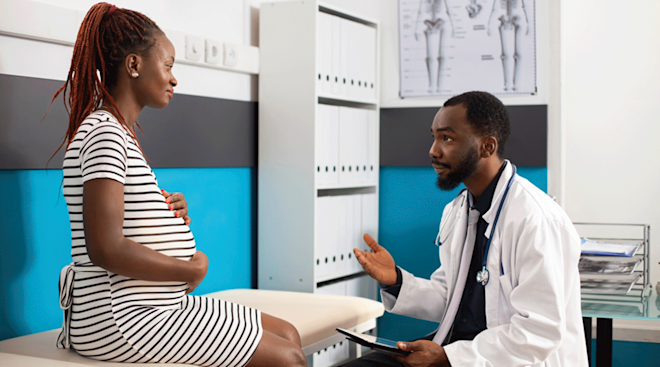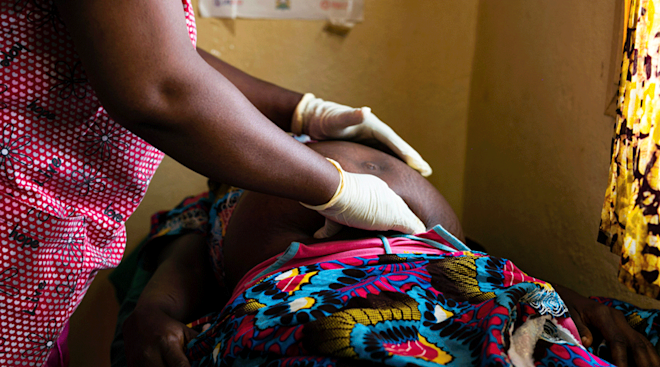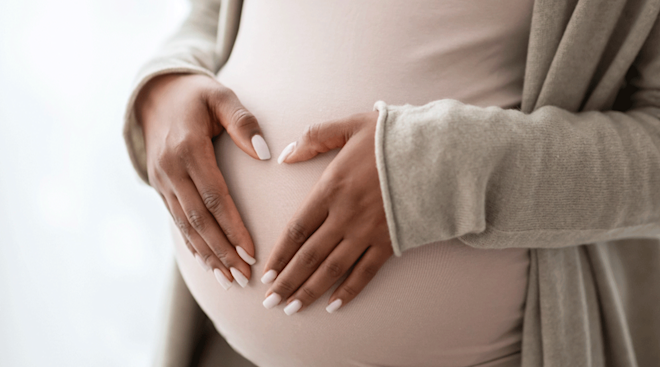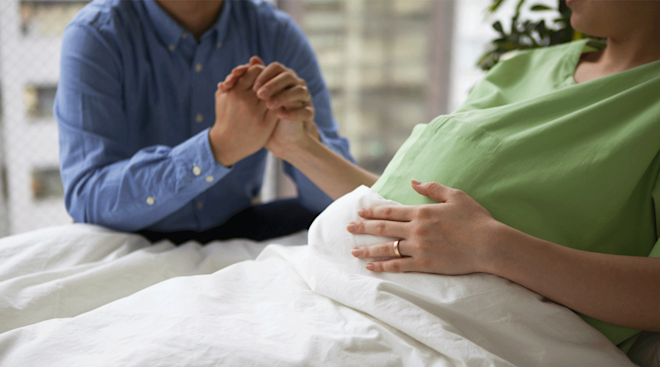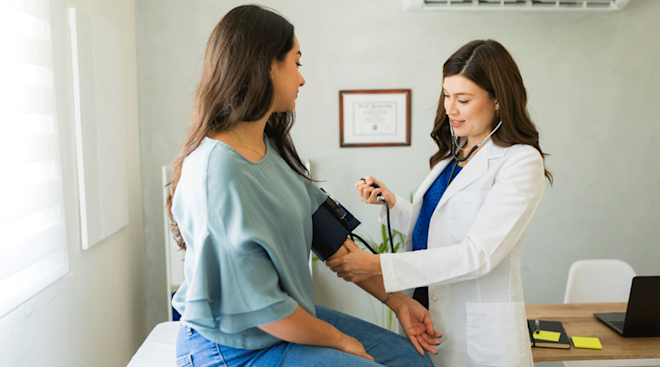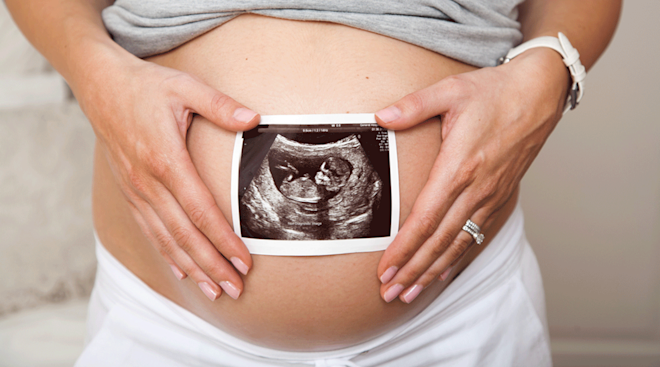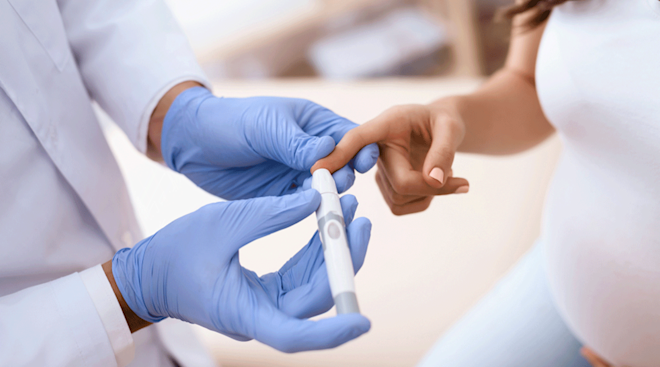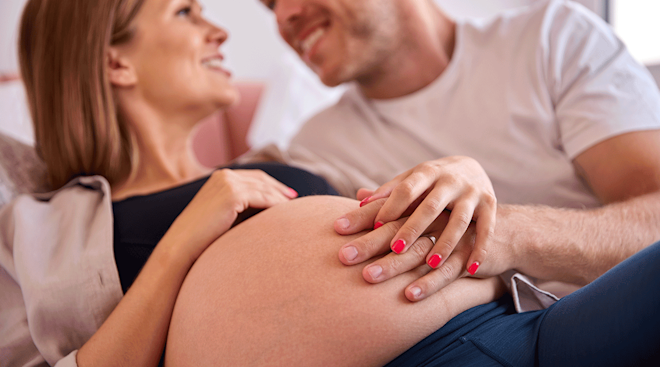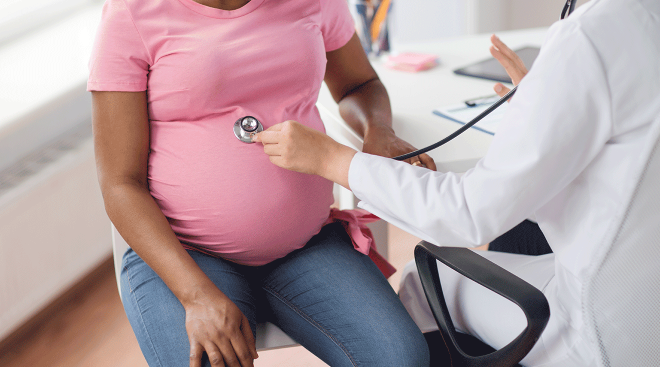Pregnant After 35: What to Know About Advanced Maternal Age
More people are choosing to start their families later in life in order to pursue their careers and other life goals. In 2020, 19 percent of all births in the United States—and 11 percent of all first pregnancies—were among women ages 35 and older, aka “advanced maternal age,” per the American College of Obstetricians and Gynecologists (ACOG).
“Many more women are getting pregnant at 35 or even 40 and older,” says Ashish Chaudhari, MD, an ob-gyn and clinical assistant professor of obstetrics and gynecology at Dartmouth’s Geisel School of Medicine. “As long as they’re cared for by qualified people, there’s no reason they can’t go on to have a very healthy, successful pregnancy.”
We spoke with experts about the benefits and risks of pregnancy after 35—and got some tips from real moms who’ve been there. Ahead, everything you should know about “geriatric pregnancy.” (We know—we don’t love the term either. More on that below!)
A person is considered to have a “geriatric pregnancy” if they’ll be 35 or older by their estimated due date, according to the Cleveland Clinic. Thankfully, "the term is considered outdated and falling out of favor,” adds Jenna Turocy, MD, an ob-gyn, reproductive endocrinologist and infertility specialist at Columbia University Fertility Center. Providers are more likely to use the term “advanced maternal age” instead, she notes. (Or you can just say, 35+ pregnancy.)
Doctors call pregnancy over 35 “advanced maternal age” based on the observation that starting around this age, there’s an increased risk of pregnancy complications and chromosomal abnormalities, which can lead to miscarriage and genetic conditions like Down syndrome, explains Turocy. That said, the specific age is somewhat arbitrary, says Turocy, as your individual health and fertility are based on many factors. “Age alone doesn’t determine a woman’s ability to have a healthy pregnancy,” she emphasizes.
So why do women generally start to experience fertility problems by their 40s—and earlier than men? Research says that while the testes produce tens of millions of new sperm every day, the ovaries contain all the eggs they’ll ever have from the moment a person is born. Every day, these eggs are exposed to oxidative stress, due to normal energy production and environmental hazards (such as air pollution). Over time, these exposures increase the odds that an egg will have damaged DNA as well as structural abnormalities. But “not all women experience the same rate of decline in egg quality,” reassures Turocy. The overall health and lifestyle of both parents matter, she adds.
ACOG notes that men have an increased risk of infertility as they get older too. “While the focus is often on female age, male fertility also declines with age, albeit less predictably,” says Turocy.
What are the chances of getting pregnant at 35+?
Starting in your early to mid-30s, your odds of conceiving begin to gradually decrease. According to ACOG, healthy couples in their 20s and early 30s have about a 25 percent chance of conceiving naturally in any given month’s menstrual cycle. By the age of 33, women have a roughly 12 to 15 percent chance to conceive per month, says Chaudhari; at around age 34, the odds decrease to 10 percent. And at roughly 38 years old, fertility rates are about 8 percent per month. “We give these numbers just to give people some sort of a gauge, but they’re not absolute numbers,” adds Chaudhari.
If you’re between the ages of 35 to 39 and have been trying to conceive for six months, it’s a good idea to see a fertility specialist, says Turocy. Success rates of assisted reproductive technology (ART), which includes in vitro fertilization (IVF), vary widely based on a person’s age, overall health, reproductive history, the quality of the partner’s sperm and the specific details of the infertility diagnosis, she says. That said, around age 35, “success rates with ART are often relatively favorable.” A fertility specialist can provide personalized advice and set realistic expectations based on your age and overall health, she adds.
What are the chances of getting pregnant at 40+?
By age 40, the odds of getting pregnant naturally in any given month’s cycle are generally below 5 percent—which is why experts generally recommend seeing a doctor as soon as you want to start trying to conceive. Individual odds vary widely. “Some women may conceive naturally in their 40s, while others may experience challenges earlier,” says Turocy. At 40, she adds, the chances of success per IVF cycle is lower and varies based on many factors. Doctors often recommend using donor eggs starting when a woman is around the age of 42, although fertility clinics’ policies vary.
Plenty of people wait to get pregnant until their mid-30s or later because they want to feel more secure in their career, relationships and finances. This can benefit both the birthing parent’s and baby’s health and wellness. “Financial stability can certainly help your mental health,” says Lisa Luther, MD, an ob-gyn at Massachusetts General Hospital in Boston.
Although pregnancy after 35 does increase the overall odds of developing complications, these risks remain low—even into a person’s early 40s, says Luther. In general, if you’re healthy, doctors expect your pregnancy to be healthy too. “The biggest thing I worry about is that fertility piece. It does take longer to get pregnant, and the need for ART can increase with increasing age,” she says.
Potential risks and complications for Mom
The most common pregnancy complications for moms over 35 include an increased risk of preeclampsia (high blood pressure during pregnancy) and gestational diabetes, says Chaudhari. Both of these conditions are very manageable, as long as they’re caught and treated early on.
Other complications, like blood clots, are slightly more common with age, says Chaudhari. And the odds of having twins also goes up with age—which in and of itself increases the risk of gestational diabetes and other pregnancy complications. Moms over 35 are also at an increased risk of preterm birth and c-section, notes Chaudhari, often due to pregnancy complications.
Potential risks and complications for baby
Because eggs have more genetic abnormalities with age, there’s an increased risk of miscarriage with advanced maternal age, says Luther. At age 35, there’s about a 20 percent risk of miscarriage with each pregnancy; the rate rises to between 33 to 40 percent by age 40, according to the Mayo Clinic.
To check for common chromosomal abnormalities in baby, your doctor may encourage noninvasive prenatal testing (NIPT), a genetic test that involves a blood draw at around week 10 of pregnancy. NIPT allows parents to make informed decisions for their family. Those who choose to continue a pregnancy can search for birth centers and pediatricians that specialize in treating specific genetic conditions. Doctors may also perform extra tests during pregnancy or at birth to help improve outcomes.
Older moms are also more likely to have placental problems, which can increase baby’s risk of being smaller than average or having growth restriction. “We have to be very careful to watch that the babies are getting the nutrition that they need in order to grow well,” says Chaudhari. In addition, the risk of stillbirth, “although very low, is slightly increased” at age 40, says Luther.
All of this might feel overwhelming. Remember that these are just generalizations—and many people who are of advanced maternal age “have absolutely healthy, normal pregnancies without any issues,” says Chaudhari.
If you’re over 35, your doctor might recommend extra testing, such as chorionic villus sampling (CVS) or amniocentesis, as well as extra ultrasounds.
At Mass General Hospital, where Luther practices, starting at age 40, healthy people without other medical conditions require weekly ultrasounds at 36 weeks through the end of pregnancy.
With advanced maternal age, your 20-week ultrasound may be more detailed. Compared to a standard scan at your ob-gyn’s office, it takes longer and is usually done at a medical center with specially trained sonographers.
Your doctor will take into consideration any health conditions, your body mass index (BMI) and whether you’ve already been pregnant to recommend additional tests. You might, for example, get an extra glucose tolerance test to check for gestational diabetes in the first trimester, as well as other blood and urine tests throughout your pregnancy. “That gives us an opportunity to jump in if we see that something isn’t quite going the way we want,” says Chaudhari.
If you’re over 40, your doctor will also likely offer a labor induction or a scheduled c-section at 39 weeks, due to the small but increased risk of stillbirth toward the end of pregnancy.
Luther says that the best way to increase your odds of conceiving—and reduce your risk of pregnancy complications—is to take care of your physical and mental health. This includes eating a balanced diet and getting preexisting health conditions like diabetes and high blood pressure under control. Regularly exercising before and during pregnancy boosts your mental health, while decreasing the risk of common pregnancy complications.
If you’re having trouble conceiving, “we do know that fertility can be affected by weight,” says Luther. If you have a high BMI, talk to your doctor about safe ways to lose weight. Also avoid smoking and excessive alcohol when you’re trying to conceive and preparing for pregnancy, adds Turocy.
Pregnancy can be overwhelming for all moms. But if you’re of advanced maternal age, you might feel extra stressed. Here, a few practical tips from moms who have been pregnant at 35 and up:
- Work with your ob-gyn and stay informed. “I had super open communication with my OB, who ran a full blood panel and hormone levels just to make sure we were dealing with any other issues from the get-go due to my age. I tracked my period via an app so I knew when my ovulation window was. The month we conceived—four months after starting—I used ovulation sticks just to be sure I knew when I was ovulating. My OB told me not to put pressure on myself to have sex every day during the week, just every other.” —Sherrie, gave birth at 39
- Take care of your mental health. “I found that I needed more mental health support with my second pregnancy. It wasn’t totally planned, so it kind of threw me for a loop. We were doing renovations in our apartment and moving into a temporary home, so I was stressed with managing that, the financial aspects, while coping with the hormonal changes. I felt stressed trying to keep up with work and taking care of a toddler. My husband was going through a busy period at work, so he wasn’t able to be home as much. Overall, I felt burned out. I have a therapist who specializes in perinatal mental health to help me navigate all of the changes.” —Tiffany, currently pregnant at 36
- Listen to your body. “As a yoga instructor and wellness business owner, I was much more tired and busy when I was pregnant with my second and didn’t have the time or energy to exercise as intensely as I had with my first. It was both extremely helpful and more realistic for me to do 10 to 15 minutes a day of low-intensity functional fitness exercises that would support my changing and growing body, help me prepare for labor, and allow me to feel strong and energized. I also had more anxiety during my second pregnancy, and incorporating gentle stretching and meditation exercises even for just a couple minutes would help ease a lot of the tension and worry.” —Janice, pregnant at 35 and 37
- Try a personal trainer or prenatal fitness app. “Being physically active early and often is so important in all pregnancies, but especially as you get older. Work with a prenatal personal trainer, ideally in person. If that’s not possible, there are some great online prenatal exercise programs. Prenatal trainers can help prevent pelvic floor dysfunction and diastasis, prepare you physically for motherhood by building strength in all the right places and focus on stretching that keeps you mobile and feeling good!” —Christine, gave birth to her third baby at 39
- Use compression socks. “Start wearing them before you think you need them. My feet got so swollen in the latter half of my pregnancy, and just for vanity I waited to wear them. I thought water and elevating my feet at night was enough. Wrong. Literally the hour I started wearing them I felt better—less pressure in my ankles and toes. I was more relaxed overall. They’re so ugly, especially in summer, but they’re so helpful. I wish I had worn them starting in month 5 or 6 of my pregnancy. It would have saved me so much discomfort.” —Katie, gave birth at 40
- Try to focus on the positive. “After having an ectopic, or tubal, pregnancy, I required cerclage for both of my pregnancies. For the second, I wasn’t allowed to be on my feet starting at about 12 weeks. I swam probably five days a week; it saved my sanity and possibly the pregnancy. I made whatever adaptations needed: I used a scooter at the grocery store, did primarily sit-down activities like reading and sewing. I was pretty bored, but I was determined. Being older helped. I knew the importance of doing whatever was needed. We were more stable in our jobs and lives and had the resources to make it all happen.” —Debbie, gave birth at 38 and 42
If you’re over 35, it may take you longer to conceive, and it’s possible that pregnancy will involve more complications. But don’t let the statistics (or scary, outdated terms like “geriatric pregnancy”) deter you if you want to get pregnant. The vast majority of people of advanced maternal age have smooth pregnancy journeys and healthy babies. It’s important to be aware of the risks (and benefits!) and work with your provider to stay as healthy as possible—that way, you’ll be prepared for what comes next.
Please note: The Bump and the materials and information it contains are not intended to, and do not constitute, medical or other health advice or diagnosis and should not be used as such. You should always consult with a qualified physician or health professional about your specific circumstances.
Plus, more from The Bump:
Ashish Chaudhari, MD, is an ob-gyn and clinical assistant professor of obstetrics and gynecology at Dartmouth’s Geisel School of Medicine. He earned his medical degree from the Wake Forest University School of Medicine.
Lisa Luther, MD, is an ob-gyn at Massachusetts General Hospital in Boston. She earned her medical degree from the State University of New York Upstate Medical University.
Jenna Turocy, MD, is an ob-gyn, reproductive endocrinologist and infertility specialist at Columbia University Fertility Center. She earned her medical degree from Georgetown University School of Medicine.
American College of Obstetricians and Gynecologists, Having a Baby After Age 35: How Aging Affects Fertility and Pregnancy, February 2023
Cleveland Clinic, Advanced Maternal Age, February 2022
Cleveland Clinic, Female Reproductive System, November 2022
Oxidative Medicine and Cellular Longevity, Oxidative Stress: Harms and Benefits for Human Health, July 2017
Developmental Biology, 6th Edition, Spermatogenesis, 2000
HSE Ireland, Age and Trying for a Baby, July 2023
Mayo Clinic, Miscarriage, September 2023
Navigate forward to interact with the calendar and select a date. Press the question mark key to get the keyboard shortcuts for changing dates.

































